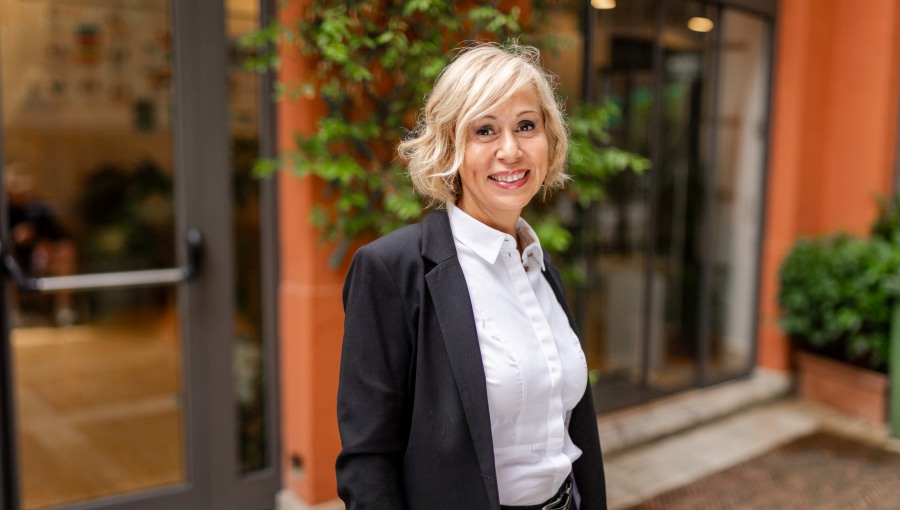Language is Key: Classics Professor Danica Pušić
Born and raised in Novi Sad, Serbia, Classics Professor Danica Pušić teaches Latin and Ancient Greek at JCU. She is a Ph.D. candidate in Linguistics at the Scuola Normale Superiore di Pisa, and she is also the official translator and interpreter at the Rome Criminal Tribunal (Italian – Serbo-Croatian; Serbo-Croatian – Italian).

Danica Pušić
Tell us about your background.
At 18, during the bombing of Serbia (1999), I fled to Quito, Ecuador. Six months later I returned to Serbia and moved to Belgrade where I earned my degree in Classics. Then, I came to Rome to specialize in Latin with Father Reginald Foster, who was the Pope’s secretary at the time. My experience at the Aestiva Romae Latinitas summer school was incredibly important for my future choices. Soon afterwards, I returned to Rome, where I have studied, worked, and lived ever since.
How did you end up at JCU?
At the time, I was an Affiliated Fellow at the American Academy in Rome and was introduced to JCU’s Art History Professor Lila Yawn, who told me about the University and invited me to apply for a position as an instructor of Greek. The rest is an eleven-year-old history!
You are fluent in a number of modern languages, but you elected to teach Latin & Greek. Why?
It is true that I speak several languages, but it was Latin and Greek that urged me to learn modern languages, not the other way around. Learning classical languages widened my horizons and offered a perfect background for grasping the structure and lexicon of other Indo-European languages. Knowing Latin, it only took me a few months to learn French, Spanish, and Italian.
What is the advantage of studying “dead” languages today?
It is a widely shared opinion that Ancient Greek and Latin are “dead” languages, however, just try withdrawing cash at any ATM in the Vatican and you will still find an option to carry out your transaction in Latin.
To this day, Latin is officially used in the Catholic Church (well, in medicine, pharmacy, law, and botany too), and outside of the Vatican, Italy still preserves the spirit of ancient times in all its beauty. There are Latin and Greek inscriptions everywhere dating back to many different periods. Knowing what they say widens one’s ideas about the historical, ethnological, and social context that has shaped the region’s history.
What are the similarities between Latin and your native Serbo-Croatian?
Latin and Serbo-Croatian share the case system, which is always a piece of surprising news to English-speaking students unless they already know one of the languages with a similar structure (among others- German, Hungarian, Russian, Greek). Moreover, Latin and Serbo-Croatian share an almost corresponding morphological and semantic structure of verbs, which when prefixed or suffixed, can express various “actional” nuances of a very similar kind.
What are the biggest challenges and rewards of teaching Latin and Greek to college students with little to no previous exposure to the language?
The biggest challenge is, by all means, teaching linguistic peculiarities, like the “cases,” to the speakers of “caseless” languages. Once the structure of Greek and Latin becomes less fuzzy and the sentences start to make sense, there is a great reward and joy in realizing that you can finally break the code which is a sentence!
Another challenge is teaching Latin and Greek in English to a group of students who have different mother tongues. English is not the best language to teach Latin and Greek and students must adapt to each other’s linguistic background. Nonetheless, linguistic diversity at JCU is certainly an asset and we all get to learn from each other.
You are an expert in the corpus of early Latin comedy (Plautus, palliata). Can you shed some light on this topic for the uninitiated?
I have been working on Plautus’ and Terence’s comedies from a linguistic perspective for years. My field of expertise has to do with the early Latin verb and finding the patterns in the way in which prefixes might either limit or deviate the meanings of the core verbs in question. There were only two ways in which the prefix would modify the core verb: as an actional change (see edo ‘I eat’ and comedo ‘I eat up’; also, bibo ‘I drink’ and ebibo ‘I drink up’) or a spatial change (fero ‘I carry’ and transfero ‘I carry over/move’). I focus precisely on the contrast between the shift in the actional categories in Early Latin and Serbo-Croatian, corresponding verbs.
Would you like to like to add anything else?
We all share linguistic features of Ancient Greek or Latin, and I feel lucky to teach Classical languages to students from all over the world. The mixture of cultures and languages in our Roman classroom offers a unique experience to all of us. At the same time, we vividly discuss differences and similarities between our native languages and Latin or Greek. This unique brainstorming rarely leaves anyone indifferent.





